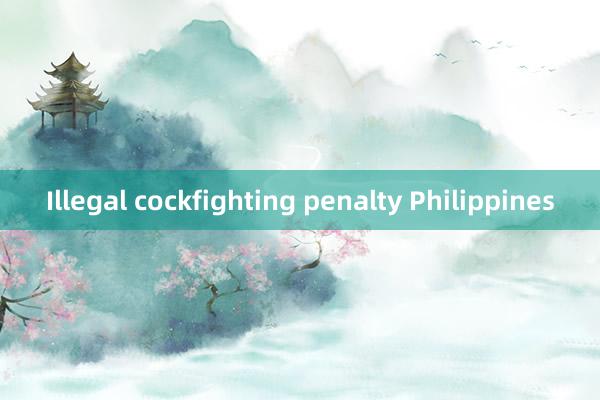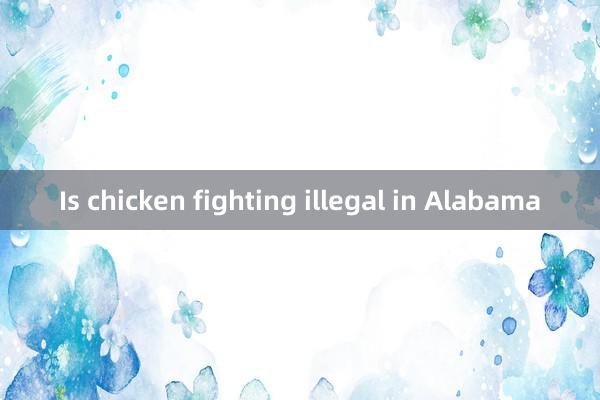Illegal cockfighting penalty Philippines

Illegal Cockfighting Penalty in the Philippines: Understanding the Laws and Consequences
Cockfighting, or sabong, holds deep cultural significance in the Philippines, dating back centuries as a popular traditional sport. While the practice remains legal in licensed arenas, there has been growing concern over illegal cockfighting, or tupada, which operates outside the confines of the law. The Philippine government has taken steps to address this issue, imposing severe penalties on those caught participating in or organizing illegal cockfights. This article provides an overview of the legal landscape surrounding cockfighting in the Philippines and the penalties associated with illegal activities related to the sport.
Legal vs. Illegal Cockfighting
In the Philippines, cockfighting is a regulated activity under Presidential Decree No. 449, also known as the "Cockfighting Law of 1974." The law allows cockfights to be held on specific occasions, such as during town fiestas, local holidays, and on authorized cockfighting days. These events must take place in licensed cockpits and under the supervision of local government officials. Cockfighting is deeply embedded in Filipino culture, and its legality in certain situations reflects an acknowledgment of its traditional significance.
However, outside these regulated environments, cockfighting becomes illegal. Tupada, or underground cockfights, occur in unauthorized locations, often without any government oversight. These events are highly dangerous, not only for the animals involved but also for the participants and spectators. Moreover, illegal cockfights often attract criminal activities, go88 tài xỉu including gambling, phim rule 34 drug use,chich69 and violence. As a result, authorities have implemented strict penalties to deter people from engaging in these unlawful practices.
Penalties for Illegal Cockfighting
Under Republic Act No. 8485, or the "Animal Welfare Act of 1998," cockfighting outside authorized arenas is strictly prohibited. Violators of this law face severe consequences, including imprisonment, fines, and potential bans from participating in legal cockfighting events.
-
Imprisonment
Individuals caught organizing or participating in illegal cockfights may face imprisonment ranging from six months to six years. The length of the sentence depends on the severity of the offense and the circumstances surrounding the illegal activity. Organizers, in particular, may face harsher penalties compared to mere participants due to their role in orchestrating the event. -
Fines
In addition to imprisonment, violators may be fined between PHP 1,000 and PHP 5,000, depending on the court’s discretion. Repeat offenders or those involved in large-scale illegal cockfighting operations may be subject to even higher fines. These financial penalties are meant to serve as a deterrent, making it costly for individuals to engage in or promote illegal cockfighting activities. -
go88 tài xỉu vip
Criminal Record
Being convicted of illegal cockfighting not only results in immediate penalties but also leaves a lasting mark on an individual’s record. A criminal record can affect employment opportunities, travel, and social standing, adding to the long-term consequences of participating in unlawful activities. -
Animal Cruelty Charges
The Animal Welfare Act also emphasizes the protection of animals from cruelty and mistreatment. Illegal cockfighting often subjects roosters to brutal treatment, including being fitted with sharp blades (known as gaffs) on their legs, leading to serious injury or death. Participants in these events may face additional charges related to animal cruelty, further increasing the severity of the penalties imposed.
Enforcement of the Law
The Philippine National Police (PNP) and local government units (LGUs) are primarily responsible for enforcing the laws against illegal cockfighting. In recent years, there has been an increase in raids targeting underground cockfights, particularly in rural areas where tupada is more common. These operations have led to the arrest of several individuals involved in the organization and participation of illegal cockfighting events.
In 2021, the Philippine Senate also pushed for stricter enforcement of online cockfighting, or e-sabong, which became popular during the COVID-19 pandemic. Although some online platforms operate legally with government permits, others have exploited the lack of regulation, leading to widespread illegal gambling. The government has since implemented tighter controls to monitor and regulate both physical and online cockfighting activities.
Social and Ethical Implications
While cockfighting remains a legal and accepted form of entertainment in specific circumstances, the rise of illegal cockfighting poses significant ethical and social challenges. The brutality of the sport, combined with the criminal activities that often accompany illegal cockfights, has sparked debates about whether cockfighting should be banned altogether. Animal rights groups continue to push for the abolition of the practice, citing the inherent cruelty involved in forcing animals to fight to the death.
Moreover, the involvement of gambling in illegal cockfights has serious social consequences, particularly in impoverished areas where individuals may be drawn into these activities in the hope of quick financial gain. The Philippine government is aware of these issues and is continuously working to strike a balance between preserving cultural traditions and protecting public welfare.
Conclusion
Illegal cockfighting remains a serious issue in the Philippines, with participants facing steep penalties under the law. While cockfighting is legally regulated in specific settings, unauthorized events pose risks not only to the animals but also to the individuals involved. The government’s continued efforts to crack down on illegal cockfighting reflect its commitment to upholding the law and protecting animal welfare. For those who appreciate the cultural aspects of cockfighting, it is essential to engage in the sport only through legal, regulated channels to avoid facing legal repercussions and to ensure the safety and well-being of all involved.
Bet99 app downloadwww.ebookgiveaways.com






